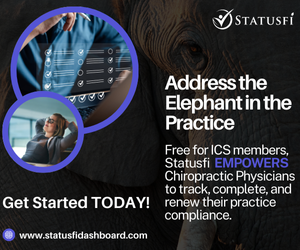
Illinois’ 5-Failure Rule
Illinois has a fairly unique licensing rule called the “Five Failure Rule.” If an applicant for an Illinois chiropractic license has five or more failures of exams, they are not eligible for licensure until they can demonstrate professional competency. Watch the video to learn more!
Transcript:
Illinois has a license rule that is different than most if not all other states. And this is what’s called the Five Failure Rule. If an applicant for a chiropractic license in Illinois has five or more failures of examinations of boards, at that point, they are not eligible for a license until they show and demonstrate professional competency. The way that the rules outline the requirement that comes from that point. So if the applicant has five or more failures of examinations, then they actually have to take what amounts to one full academic year from an accredited college, chiropractic college again. So that would be 960 hours.
Now, there is an alternative that would allow them to demonstrate through an accredited chiropractic program or an equivalent formal professional study or training in an accredited chiropractic program. But those actually have to be approved by the division by IDFPR. Now, the problem with that is many times, those probably are going to be approved in advance, and the vast majority of our students are going to be required to obtain an additional year of school a 960 hours. Now actually a lot of latitude is given up to the schools. And I know that as far as in the Illinois area, Palmer, National, and Logan all have programs to assist students, or recent graduates if you will, that need this additional education. They can help you put together programs, you can contact those schools if you’re in this particular situation.
One of the questions that we get affiliated with the five failures as well, how does that work Marc, because there are different sections are there different domains, and each one of the exams. So, for example, In parts one and two, you know, there are six domains each, and the way it works, if you pass four or more domains of each one of those and have to retake because maybe you failed one or two of the domains, you only have to take those domains that you failed. Now, from what MBCE indicates is if you if you only pass three, then you would actually have to take the full domain again. Anytime that you sit down in a session, or in a test-taking session at that stage, then that counts as an exam. And so if you fail six domains, or you fail one domain, that still counts as one failure in those cases. And then if you come back and retake that exam, and if you fail one or more domains, for that same part again, then that would count as a second failure. So basically, you can take the total number of times that you’ve sat for exams, and parts 1,2,3, and 4, subtract four, and that will give you a quick indicator as to the number of failures that you would have accumulated at this point. MBCE, by the way, if you’re curious, has statistics for passage rates, through 2021. On their website, you can go take a look at the average ranges, you know, throughout the, if you will, kind of the low to mid-80s. For the most part. Some of the parts, part three, for example, on occasion, has much higher passage rates, but you can go take a look at their passage rates if you want more information in that regard for each one for each one of those parts.
But Illinois does have the five failure rule. And after talking to a number of experts, based on the information we have, were never aware of a time that they do not require the applicant to obtain the additional 960 hours. So that is a very firm rule. It’s not going to be waived by the medical licensing board or the medical board now, as it’s called in a five failure rule is something that you need to be aware of. If you’re a student, if you’re looking to hire a recent graduate, you also want to be aware of it, because it does potentially impact the hiring marketplace and we wanted you to be aware.
Now, another big thing is just to make sure that we clarify this rule is actually on par It is demonstrated with parity with MDs and DOs as well so it is equally applied across the board. They have very similar requirements for passage of their particular parts and examinations and board examinations. Hopefully, this helps you out and we’ll catch you next week.

















